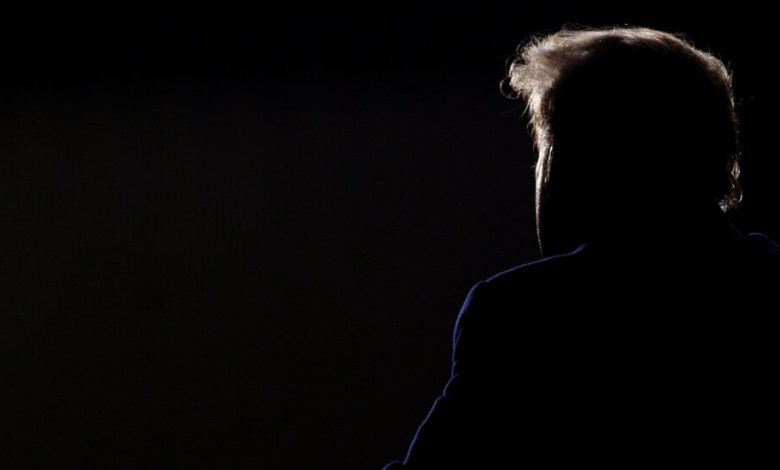The Case for Disqualifying Trump Is Strong

It’s been just over two weeks since the Colorado Supreme Court ruled that Section 3 of the 14th Amendment disqualifies Donald Trump from holding the office of president of the United States. It stayed the effect of that ruling until this week. Pending further action from the Supreme Court of the United States — which Trump asked on Wednesday to overturn the ruling — the former president is off the Republican primary ballot in Colorado.
I spent way too much of my holiday vacation reading the legal and political commentary around the decision, and as I did so I found myself experiencing déjà vu. Since the rise of Trump, he and his movement have transgressed constitutional, legal and moral boundaries at will and then, when Americans attempt to impose consequences for those transgressions, Trump’s defenders and critics alike caution that the consequences will be “dangerous” or “destabilizing.”
There is already a “surge in violent threats” against the justices of the Colorado Supreme Court. The Yale Law School professor Samuel Moyn has argued that “rejecting Mr. Trump’s candidacy could well invite a repeat of the kind of violence that led to the prohibition on insurrectionists in public life in the first place.” Ian Bassin, a Protect Democracy co-founder, has suggested — and I agree — that even legal analysis of the 14th Amendment “is being colored by the analyst’s fear of how Trump and his supporters would react” to an adverse ruling.
This is where we are, and have now been for years: The Trump movement commits threats, violence and lies. And then it tries to escape accountability for those acts through more threats, more violence and more lies. At the heart of the “but the consequences” argument against disqualification is a confession that if we hold Trump accountable for his fomenting violence on Jan. 6, he might foment additional violence now.
Enough. It’s time to apply the plain language of the Constitution to Trump’s actions and remove him from the ballot — without fear of the consequences. Republics are not maintained by cowardice.
To understand the necessity of removing Trump, let’s go first to the relevant language from the 14th Amendment and then to some basic rules of legal interpretation. Here’s the language:
“No person shall be a Senator or Representative in Congress, or elector of President and Vice-President, or hold any office, civil or military, under the United States, or under any State, who, having previously taken an oath, as a member of Congress, or as an officer of the United States, or as a member of any State legislature, or as an executive or judicial officer of any State, to support the Constitution of the United States, shall have engaged in insurrection or rebellion against the same, or given aid or comfort to the enemies thereof. But Congress may by a vote of two-thirds of each House, remove such disability.”
You don’t have to be a lawyer to comprehend those words. You simply need some basic familiarity with American civics, the English language and a couple of common-sense rules of thumb. First, when interpreting the Constitution, text is king. If the text is clear enough, there is no need for historical analysis. You don’t need to know a special “legal” version of the English language. Just apply the words on the page.
Second, it’s crucial to understand that many of the Constitution’s provisions are intentionally antidemocratic. The American republic is a democracy with guardrails. The Bill of Rights, for example, is a check on majoritarian tyranny. The American people can’t vote away your rights to speak, to exercise your religion or to due process. The Civil War Amendments, including the 14th Amendment, further expanded constitutional protections against majoritarian encroachment. Majorities can’t reimpose slavery, for example, nor can they take away your right to equal protection under the law.
So when a person critiques Section 3 as “undemocratic” or “undermining democracy,” your answer should be simple: Yes, it is undemocratic, exactly as it was intended to be. The amendments’ authors were worried that voters would send former Confederates right back into public office. If they had believed that the American electorate was wise enough not to vote for insurrectionists, they never would have drafted Section 3.
Moreover, you’ll note that the plain text of the amendment doesn’t require a court conviction for insurrection or rebellion. Again, this is intentional. The 14th Amendment originally applied to countless Confederate soldiers and continued to apply to them even after they were pardoned by President Andrew Johnson in 1868. It was not until the Amnesty Act of 1872 that most former Confederates were permitted to serve in office again.
Which brings us to Donald Trump, who is currently facing a host of federal and state criminal charges related to his plot to overturn a lawful election and retain power illegitimately. He wasn’t merely involved in legal subterfuge, including by pressuring public officials to alter vote totals. He summoned the mob, told them to march to the Capitol and enlisted them to “fight like hell.” (At the same event, Rudy Giuliani urged “trial by combat.”) When the attack on the Capitol was underway, he inflamed the crowd in real time by tweeting that “Mike Pence didn’t have the courage to do what should have been done.”
Yes, he also asked to the crowd to protest “peacefully and patriotically.” But as the Colorado Supreme Court affirmed, this “isolated reference” does not “inoculate” Trump, given “his exhortation, made nearly an hour later, to ‘fight like hell’ immediately before sending rallygoers to the Capitol.”
What do you call the effort to overthrow a lawfully elected government through a combination of violence and legal subterfuge? In its ruling, the Colorado Supreme Court reviewed a variety of colloquial and legal definitions of insurrection and reached a common-sense conclusion “that any definition of ‘insurrection’ for purposes of Section 3 would encompass a concerted and public use of force or threat of force by a group of people to hinder or prevent the U.S. government from taking the actions necessary to accomplish a peaceful transfer of power in this country.”
I have respect for those who argue that Jan. 6 was merely a riot and not a true “insurrection or rebellion,” but the clear and undisputed aims of the Trump scheme are what elevate his misconduct to rebellious status. The effort to steal the election wasn’t a mere protest. It represented an effort to change the government of the United States. I was open to Jonathan Chait’s argument that the term “insurrection” is not the “most precise” way to describe Jan. 6, but he lost me with this distinction: “Trump was not trying to seize and hold the Capitol nor declare a breakaway republic.”
It’s true that Trump wasn’t declaring a breakaway republic, but he was attempting to “seize and hold” far more than the Capitol. He was trying to illegally retain control of the executive branch of the government. His foot soldiers didn’t wear gray or deploy cannons, but they did storm the United States Capitol, something the Confederate Army could never accomplish.
There are also respectable arguments that the reference to “any office, civil or military, under the United States” does not include the president. As Kurt Lash wrote last month in The Times, “It would be odd to stuff the highest office in the land into a general provision that included everything from postmasters to toll takers.” He calls the text “ambiguous.”
But is it, really? As Steven Portnoy wrote in an excellent piece for ABC News, the question of whether the section applied to the president and vice president was raised in the ratification debates, and Senator Lot Morrill of Maine provided the answer: “Let me call the Senator’s attention to the words ‘or hold any office, civil or military, under the United States.’”
Remember, when reading the Constitution, words still retain their ordinary meaning, and the president is an officer under the United States by any conventional meaning of the term. In many ways, it would be fantastical to conclude otherwise. Is it really the case that insurrectionists are excluded from every office except the most powerful? One should not read constitutional provisions in a way that reaches facially absurd results.
Moreover, it’s important to note that none of the legal analysis I’ve offered above relies on any sort of progressive or liberal constitutional analysis. It’s all text and history, the essence of originalism. In fact, the most influential law review article arguing that Trump is disqualified is by William Baude and Michael Stokes Paulsen, two of the most respected conservative legal minds in the United States.
So no, it would not be a stretch for a conservative Supreme Court to apply Section 3 to Trump. Nor is it too much to ask the court to intervene in a presidential contest or to issue decisions that have a profound and destabilizing effect on American politics. In 2000, the Supreme Court effectively decided a presidential election at the finish line, ending Al Gore’s bid in a narrow decision that was criticized by some as partisan in nature.
Moreover, in decisions ranging from Brown v. Board of Education to Dobbs v. Jackson Women’s Health Organization, the court has been quite willing to issue sweeping rulings that both inflame dissent and trigger political backlash. Fear of a negative public response cannot and must not cause the Supreme Court to turn its back on the plain text of the Constitution — especially when we are now facing the very crisis the amendment was intended to combat.
Indeed, the principal reason the fear of negative backlash is so strong and so widely articulated is the seditious nature of the Trump movement itself. When the Supreme Court ruled against Al Gore, there was no meaningful concern that he’d try to engineer a violent coup. But if the court rules against Trump, the nation will be told to brace for violence. That’s what seditionists do.
Republicans are rightly proud of their Civil War-era history. The Party of Lincoln, as it was known, helped save the Union, and it was the Party of Lincoln that passed the 14th Amendment and ratified it in statehouses across the land. The wisdom of the old Republican Party should now save us from the fecklessness and sedition of the new.





